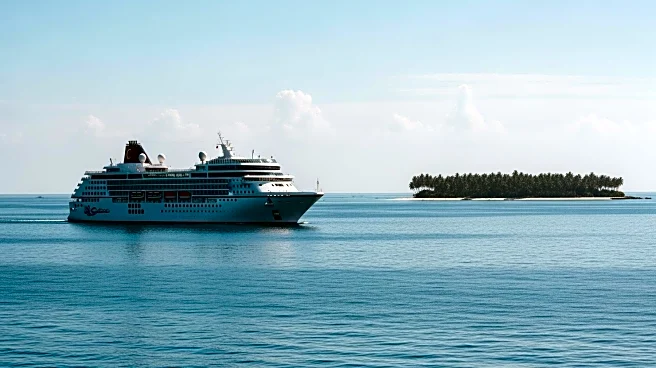What's Happening?
AAA has forecasted that a record 21.7 million Americans will embark on ocean cruises in 2026, marking the fourth consecutive year of growth in this sector. This projection, developed in collaboration with
Tourism Economics, indicates a steady increase from 20.7 million expected in 2025 and 19.1 million in 2024. Stacey Barber, vice president of AAA Travel, attributes this growth to the increasing demand for ocean cruises among U.S. travelers, highlighting the variety, convenience, and memorable experiences these trips offer. The Caribbean remains the most popular destination, with 72% of American passengers expected to sail there, followed by Alaska at 7% and the Mediterranean at 5%. Shorter-length cruises are gaining popularity due to their convenience, allowing cruise lines to offer more itineraries and sell more cabins.
Why It's Important?
The projected increase in cruise passengers reflects a significant trend in the travel industry, indicating a robust recovery and growing interest in ocean cruises among Americans. This growth benefits the cruise industry economically, as increased demand leads to higher revenues and potential expansion opportunities. The popularity of Caribbean cruises, bolstered by shorter itineraries, suggests a shift in consumer preferences towards more flexible and accessible travel options. This trend could influence cruise lines to adapt their offerings to meet changing consumer demands, potentially impacting pricing, marketing strategies, and destination planning.
What's Next?
As the cruise industry anticipates record numbers, cruise lines may focus on expanding their fleet and enhancing their offerings to accommodate the growing demand. This could involve introducing new routes, investing in larger ships, and improving onboard amenities to attract more passengers. Additionally, the industry might see increased competition among cruise lines to capture market share, leading to innovative marketing campaigns and competitive pricing strategies. Stakeholders, including travel agencies and tourism boards, may also collaborate to promote cruise travel and capitalize on this upward trend.
Beyond the Headlines
The growth in cruise travel could have broader implications for environmental sustainability, as increased cruise traffic may raise concerns about the ecological impact on popular destinations like the Caribbean. Cruise lines might face pressure to adopt greener practices and technologies to mitigate their environmental footprint. Furthermore, the rise in cruise tourism could influence local economies in destination regions, potentially leading to increased investment in infrastructure and services to support the influx of visitors.











